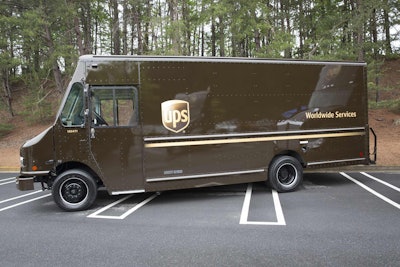 By drastically increasing its use of renewable diesel, UPS continues to maintain its position as one of the shipping industry’s biggest proponents of alternative fuel.
By drastically increasing its use of renewable diesel, UPS continues to maintain its position as one of the shipping industry’s biggest proponents of alternative fuel.Earlier this year UPS garnered headlines, including in the New York Times, after signing large contracts with three renewable diesel fuel companies that, over the next three years, will increase the company’s use of renewable diesel 15 times over.
There’s no doubt that the popularity of renewable diesel continues to grow. This week the State of California, which has one of the largest fleets in the nation, announced that its vehicles will be filling up on renewable diesel in lieu of biodiesel and petroleum-based diesel.
Also this week, Volvo Trucks North America became the first OEM to endorse renewable diesel.
The Truck and Engine Manufacturers Association (EMA) and Cummins Engine both told hardworkingtrucks.com recently that more data is needed on the fuel. Neither the EMA or Cummins has endorsed it. Cummins says it expects to be done with its current phase of testing in January, but the company adds that it will continue its tests if the results are not conclusive enough.
UPS told Hardworkingtrucks.com that for the past year it has used three million gallons of renewable diesel and is satisfied with the results. Its latest contracts will increase its renewable diesel supply to 46 million gallons.
With more than 5,000 low-emissions vehicles, UPS runs one of the shipping industry’s largest private alternative fuel fleets in the world. Besides renewable diesel, the company also uses all-electrics, electric hybrids, hydraulic hybrids, propane, compressed natural gas, liquefied natural gas and biomethane.
Hardworkingtrucks.com interviewed UPS regarding its use of renewable diesel.
HWT: Why did UPS decide to begin using renewable diesel?
UPS: Advanced alternative fuels like renewable diesel are an important part of our strategy to reduce the carbon emissions impact of our fleet. We have used more than three million gallons of renewable diesel to date with positive results. Renewable diesel has a huge impact significantly reducing lifecycle greenhouse gas emissions by up to 90 percent less versus conventional petroleum diesel. Renewable diesel also performs well in cold weather, does not have any blending limitations and can be easily ‘dropped in’ to our fuel supply chain without modifications to our existing diesel trucks and equipment.
HWT: What have been the appreciable differences, if any, in making the switch to renewable diesel in terms of truck performance?
UPS: Renewable diesel is an advanced hydrocarbon-based fuel that is fully interchangeable with petroleum diesel and has no negative impact on the performance of the truck.
HWT: Where are UPS trucks using renewable diesel?
UPS: This past July 29 UPS announced that Neste, Renewable Energy Group (REG) and Solazyme will supply renewable diesel to UPS to help facilitate the company’s shift to move more than 12% of its purchased ground fuel from conventional diesel and gasoline fuel to alternative fuels by the end of 2017. UPS has been using renewable fuels for more than a year in trucks operating in Texas and Louisiana. The new agreements pave the way for expanded use across the U.S. and potentially in parts of Europe.
HWT: Does UPS have its own fuel depot where its trucks fill-up on renewable diesel? Or is an outside vendor used?
UPS: We have our own fueling stations.
HWT: What is the cost difference, percentage wise, in using renewable diesel?
UPS: In the U.S., RD is competitive with petroleum-based diesel.









